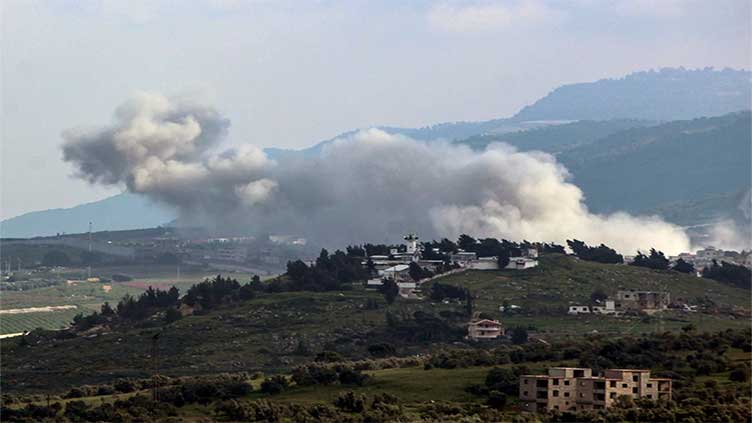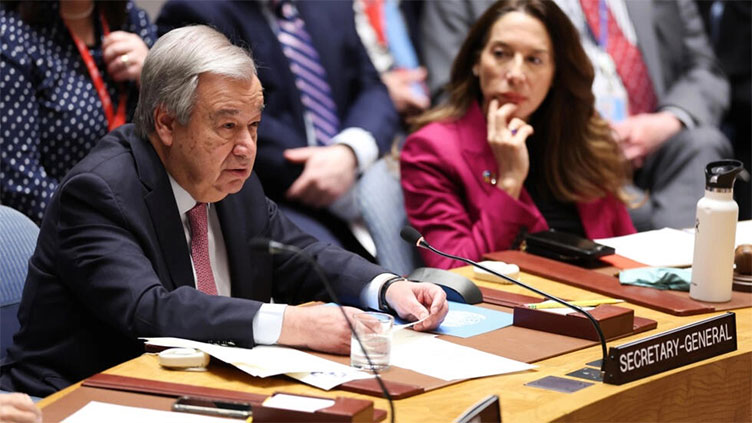Israel continues air strikes on Gaza after Iran attack as UN chief calls for 'maximum restraint'

World
The Hamas government said Israeli aircraft launched "dozens" of strikes overnight on central Gaza
Palestinian Territories (AFP) – Israel launched dozens of air strikes on Gaza overnight, Hamas said Monday, as the Israeli army said it will not be distracted from the war after Iran's unprecedented attack heightened fears of wider conflict.
"Even while under attack from Iran, we have not lost sight, not for one moment, of our critical mission in Gaza to rescue our hostages from the hands of Iran's proxy Hamas," Israeli military spokesman Rear Admiral Daniel Hagari said late Sunday.
As mediators attempt to reach a deal to halt the fighting in Gaza, fears grew over Israeli plans to send troops into Rafah, the far-southern city where the majority of the Palestinian territory's 2.4 million people have taken refuge.
The Hamas government media office said Israeli aircraft launched "dozens" of strikes overnight on central Gaza.
Meanwhile, Israeli army opened fire on civilians who were trying to cross to the north to reunite with family members, witnesses told AFP.
Rumours of a reopened Israeli checkpoint on the coastal road from the besieged enclave's south to Gaza City in the north sent thousands of Palestinians heading north over the weekend, despite Israel denying it was open.

‘Cannot afford more war’
United Nations Secretary General Antonio Guterres warned the international community on Sunday against deeper descent into conflict, addressing the Security Council during a meeting over Iran's weekend attack on Israel.
"Neither the region nor the world can afford more war," Guterres said.
"The Middle East is on the brink," he told the Security Council.
"The people of the region are confronting a real danger of a devastating full-scale conflict. Now is the time to defuse and de-escalate," he added, calling for "maximum restraint."
Late on Saturday, Iran launched a direct attack on its long-time arch foe Israel for the first time, firing a wave of more than 300 missiles and drones.
Nearly all of them were intercepted by Israel and others, including the United States, Jordan and Britain.
According to the Israeli army, 12 people were injured.
Iran said its attack came in response to a deadly April 1 air strike on Tehran's consulate building in the Syrian capital Damascus that was widely blamed on Israel.
That attack killed seven Iranian Revolutionary Guards, including two senior generals, and prompted Iranian threats of retaliation.
The unprecedented exchange, marking a major escalation between the two countries, has sparked renewed fears of a broader conflict, including the potential for an Israel counterstrike.
'Step back from the brink'
The United States said on Sunday it will not join any Israeli counterattack on Iran, with President Joe Biden warning Prime Minister Benjamin Netanyahu to "think carefully" about any escalation.
The rising tensions come against the backdrop of Israel's six-month-old war against Hamas in Gaza, which began after the Palestinian militant group's unprecedented attack in Israel October 7 which resulted in the deaths of 1,170 people, mostly civilians, according to an AFP tally based on Israeli figures.
Israel's retaliatory offensive has killed at least 33,729 people in Gaza, mostly women and children, according to the territory's Hamas-run health ministry.
Since the start of the conflict, Iran-backed groups in Iraq, Lebanon, Syria, and Yemen have carried out a flurry of attacks on Israeli and Western targets.
Sunday's Security Council session on the simmering crisis came at Israel's request, with its Ambassador Gilad Erdan urging the council to "take action (and) condemn Iran for their terror."
The body must "impose all possible sanctions on Iran before it's too late," he said.
Iran's UN envoy Amir Saeid Iravani meanwhile insisted the Islamic republic was exercising its "inherent right to self-defense."
"The Security Council... failed in its duty to maintain international peace and security," Iravani said.
Therefore, Tehran "had no choice" but to respond, he said, adding that his country does "not seek escalation or war," but will respond to any "threat or aggression."
During his speech, Guterres repeated his condemnation of Iran's strikes on Israel, and the Israeli attack on the Iranian consulate in Damascus.
"It's time to step back from the brink. It is vital to avoid any action that could lead to major military confrontations on multiple fronts in the Middle East," Guterres said.
He also repeated his call for an "immediate humanitarian ceasefire" in Gaza, which experts warn is on the verge of famine.
Truce deal 'on the table'
Hostilities between Israel and Iran's regional allies have flared since the outbreak of the war in Gaza.
Hamas's October 7 attack that sparked the fighting resulted in the deaths of 1,170 people, mostly civilians, according to Israeli figures.
Attempting the journey back to northern Gaza, displaced resident Basma Salman said, "even if it (my house) was destroyed, I want to go there. I couldn't stay in the south."
"It's overcrowded. We couldn't even take a fresh breath of air there. It was completely terrible."
Late Saturday, Hamas said it had submitted its response to a truce plan presented by US, Qatari and Egyptian mediators at talks that started in Cairo on April 7.
Hamas said it was sticking to its previous demands, insisting on "a permanent ceasefire" and the withdrawal of the Israeli army.
Israel's Mossad spy agency called this a rejection of the proposal, accusing Hamas of "continuing to exploit the tension with Iran" and aiming for "a general escalation in the region".
But the United States said mediation efforts continue.
"There's a new deal on the table... It is a good deal" that would see some hostages released, fighting halted and more humanitarian relief into Gaza, Kirby said.


